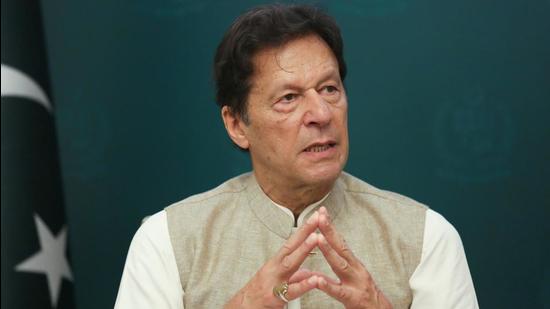Pakistan is caught in a trap of its own making
Khan’s increased tensions with the army have come at a time Pakistan needs civil-military stability and political calm. It is facing immense external and domestic challenges
After a three-week tantrum, Pakistan’s prime minister (PM) Imran Khan signed off on the appointment of lieutenant-general Nadeem Anjum on October 26 as director-general of the Inter-Services Intelligence (DG ISI).

Once the army, on October 6, announced the posting of the incumbent DG ISI, Lt Gen Faiz Hameed, as commander, Peshawar Corps, and of Anjum in his place, there was no way army chief General Qamar Bajwa could have backed off. This is especially because the corps commanders were solidly behind him. For them, it was a question of the izzat of the army. Thus, unless Khan was willing to sacrifice his government sooner rather than later, he had to cave in.
Significantly, the army gave Khan a long rope, for it too did not wish to precipitate matters. It knew that Khan depended on the political skills of Hameed. Besides, reports have gained traction in Pakistan that Khan’s wife, who is known to dabble in supernatural phenomena, advised her husband against a change in the ISI’s top job; and evidence suggests that Khan is a superstitious man.
The upshot of Khan’s vain resistance is that his relationship with the army has been damaged. Will the generals trust him to appoint their next chief when Bajwa’s extended term ends in November 2022? The question, therefore, is if the army will engineer a change in the civilian government by late summer next year. In any event, the pace of politics will gather more steam in the months ahead with the Opposition parties sensing an opportunity to increase pressure greatly on Khan who has, as it is, lost much of his political sheen.
The irony is that Khan’s increased tensions with the army have come at a time Pakistan needs civil-military stability and political calm. It is facing immense external and domestic challenges. Its success in Afghanistan through the Taliban cannot contribute to mitigating its difficulties. Indeed, one sign of the country’s great problems is the lack of triumphalism among Pakistani interlocutors at Track 2 events on their country’s diplomatic and intelligence advantage in Afghanistan. This is because they are aware that now their western neighbour needs immense humanitarian and economic assistance to prevent a collapse that would trigger substantial refugee flows.
There is no doubt that Pakistan has the assurance of the Chinese and, to an extent, Russian support in the context of Afghanistan. Its difficulty is that Western powers are now demanding that Pakistan exercises its undoubted influence on the Taliban to get their human rights policies more in line with international standards. On the other hand, Pakistan is asking the international community to sustain Afghanistan and give the Taliban time to adjust to global standards of behaviour. It is doing so for it believes, with more than some justification, that all the major powers do not want complete chaos in Afghanistan.
On the economic front, Khan has won some respite because the Saudis have agreed to deposit $3 billion in Pakistan’s coffers. They have also agreed to extend a $1.2 billion line of credit for oil supplies. The fact is that regional and global powers do not want a country with nuclear weapons to suffer an economic breakdown. Hence, Pakistan will always be put on a financial drip as the Saudis have done now, and as they, and others, have done in the past too.
Besides, intense negotiations are on between Pakistan and the International Monetary Fund (IMF) for the resumption of the Fund’s assistance. Despite difficulties, both will eventually agree to terms which will enable the resumption of the Fund’s financial assistance. But the Fund’s objective of putting Pakistan on the road to economic stability, leave alone prosperity, can never be achieved. The dysfunctional nature of the State and the country’s India obsession prevent that.
An immediate issue that Khan’s government faces is the insistence of the Tehreek-e-Laibak-e-Pakistan (TLP) for the closure of the French embassy and breaking off connections with France. This impossible demand emanates from anger at France’s approach on the issue of caricatures of Prophet Mohammad. TLP is now proscribed, but has influence as it espouses Islamic causes that strike a responsive chord among substantial sections of the people. The group is not averse to undertaking violence against the police and the government, and the army has given in to its demands on earlier occasions. Now, its cadres are on a march to Islamabad, and in Punjab, the Rangers have been called in to maintain order. The government is talking tough, but for how long will it continue to do so?
Meanwhile, the army is watching Khan’s discomfiture with some satisfaction. It will, however, not let the situation get completely out of hand.
Pakistan will continue its bumpy ride for it is caught in the web of sustained bigotry and poor economic prospects. It cannot cut through this web without changing its negative course on India. That prospect is not on the horizon.
Vivek Katju is a retired diplomat
The views expressed are personal
All Access.
One Subscription.
Get 360° coverage—from daily headlines
to 100 year archives.



HT App & Website







